For the next three weeks, C-U is spoiled for choice when it comes to local theatre. An ideal world would give everyone time to see all three major productions, and it’s definitely doable with just a little schedule juggling. If you get to the point where you have to prioritize, however, it’s worth noting that Dontrell, Who Kissed the Sea is socially relevant to this moment in history, unique in its themes and presentation, and well worth your time and attention.
A coming-of-age tale set now, during a time that almost forces young adults to stay young, Dontrell, Who Kissed the Sea explores generational differences and one man’s awareness of where he fits into history. The central tension in the play surrounds Dontrell’s acceptance to Johns Hopkins University, and his mother’s foreboding that something will keep him from arriving safely on the campus which is just a few miles away. Dontrell is “acting weird,” due to unusual dreams he’s been having regarding his ancestry. What no one wants to talk about is that the family has a long history of mental illness, something that is only briefly touched upon, which helps prop up his mother’s fears and actions.
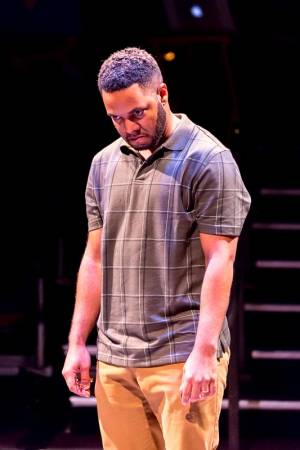 The climactic confrontation that is brought about by these fears, during a family party that is meant to set Dontrell straight, played out quickly and a little awkwardly, but resulted in a show-stopping monologue for Dontrell’s father, as played by Raffeal A. Sears. Just the words of speech gave me chills, celebrating the strength of empowered women and rejecting a society that degrades them as “bitches,” but Sears’ delivery was the only moment that I wished the play was not in the round. I got to see Dontrell’s emotional response, but because of my choice, his dad’s back was to me and I wasn’t able to experience the visual of what he was feeling.
The climactic confrontation that is brought about by these fears, during a family party that is meant to set Dontrell straight, played out quickly and a little awkwardly, but resulted in a show-stopping monologue for Dontrell’s father, as played by Raffeal A. Sears. Just the words of speech gave me chills, celebrating the strength of empowered women and rejecting a society that degrades them as “bitches,” but Sears’ delivery was the only moment that I wished the play was not in the round. I got to see Dontrell’s emotional response, but because of my choice, his dad’s back was to me and I wasn’t able to experience the visual of what he was feeling.
The staging for this show in the round was among the best I’ve seen here in C-U. The majority of the action was performed on the bias, so most moments were easy to see from all four directions. I sat almost due East, but if I had to do it again, I would sit in the South-West corner, for both the father’s scene and to see the other side of the mirror that Erika looks into. The experience of seeing other members of the audience as backdrop, however, was very worthwhile, and intentional. According to the director, Tyrone Phillips, “It forces everyone in the space to look at each other and see one another as family…their responses are also a part of the play.”
This element is immediately apparent, because the opening dream sequence is one that is almost unbearable to watch. For relief, you might look up into the audience in the background across the stage, but instead you just see more shock and horror reflected back at you. So you look back. There is one action which is repeated, relentlessly, to the point where it was physically painful for me to see one more time. It’s exactly what theatre is supposed to do, how it is supposed to make you feel. From a friend, I discovered that the precise elements of the dream are not dictated by the script, so much of it was contributed by Mr. Phillips. For my money, just that opening scene would be worth the price of admission.
It also set the tone for the rest of the play as an emotional rather than logical one. I will be honest, I found the plot to be a little scattered, with some glaring loose ends and obvious plot devices. Yet all of those drawbacks served a larger emotional truth that moved Dontrell’s spiritual journey forward. When he’s reacting to his mother’s confrontation, it would have seriously derailed the momentum to take a moment to discuss how her actions would get Shea fired. If we stopped for a reality check about Erika’s revelation, it would not have brought Dontrell to a place where he could close the circle of his family’s history. While slightly grating, simply hanging on to see how these things play out eventually buys back the small flaws.
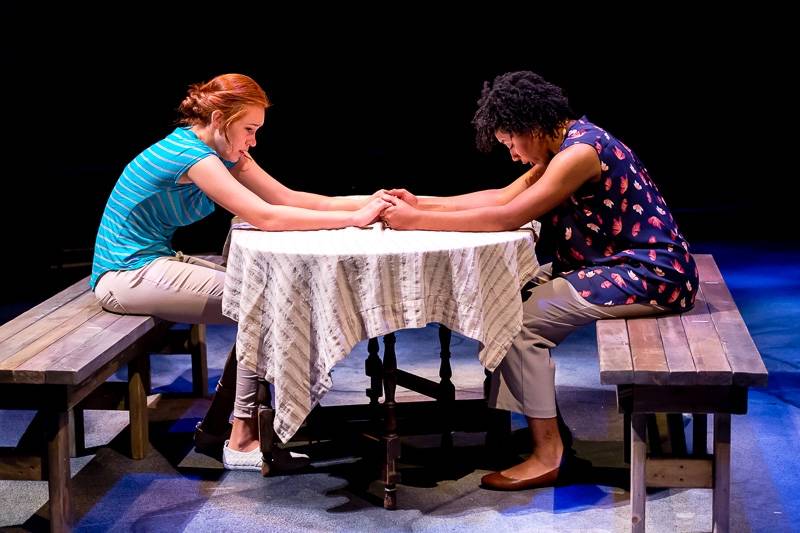
The entire cast was clearly invested in that larger emotional truth, as well. It was apparent that everyone was dedicated to expressing their characters wholeheartedly, whether it was Mom’s (Noelle Klyce) unyielding dictate that Dontrell make it to his first day of class or Dad’s fully-disengaged engagement with his television off-stage in his “den”. Marlene Slaughter’s performance as younger-sister Danielle, especially her interaction with Dontrell’s best friend Robby (Xavier Roe), was consistently believable and enjoyable, bringing just the right amount of petulance and comedic timing to relieve tension. Vincent Williams as Dontrell had quite a challenging role, featuring a lot of code-switching and confusion as he tried to unravel his visions and complete his quest, but he enthusiastically guided us through his journey.
Like with most black-box productions, the settings were few and able to be configured in multiple functions, but another noteworthy aspect was the choreography of moving these pieces, especially the benches. The way the ensemble cast moved every little item was on a beat, coordinated, and truly like dancing. As an audience member, it was fascinating to enjoy watching what is usually considered to be an invisible part of the production. My only technical gripe would be that the recorded sounds – a speech during the dream sequence and a beat Robby raps to – really overpowered the actors’ dialogue. This definitely was not the fault of the performers, who were very audible all other times, even during two key moments where the only sound is an exhalation in unison.
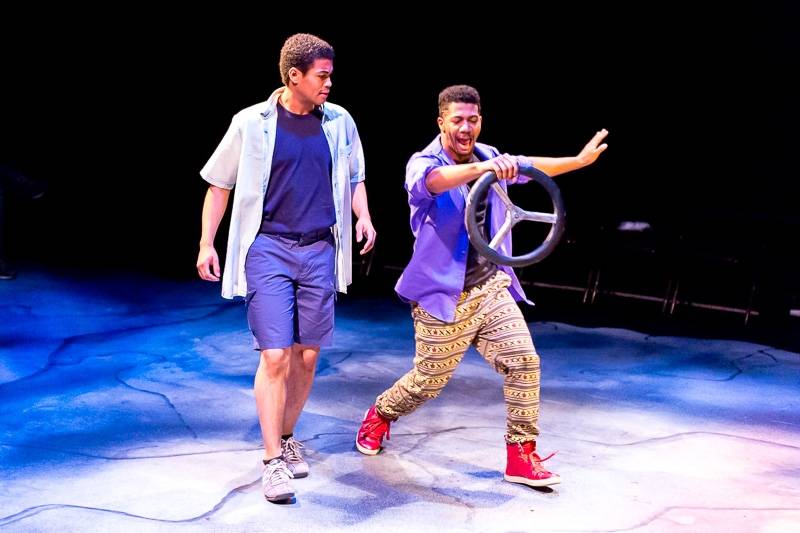
 Everything I’ve outlined here was building to an incredible final moment that defies description, but is the ultimate reason to go see this particular work. While Mr. Phillips discussed the importance of theatre reflecting the life we see around us every day by including more diverse casts and scripts, another key purpose is to bring the audience new experiences. The last moments of the production, including the curtain call, provide an immersive experience that may be very new to many members of the C-U theatre audience. Mr. Phillips, I think, said it best:
Everything I’ve outlined here was building to an incredible final moment that defies description, but is the ultimate reason to go see this particular work. While Mr. Phillips discussed the importance of theatre reflecting the life we see around us every day by including more diverse casts and scripts, another key purpose is to bring the audience new experiences. The last moments of the production, including the curtain call, provide an immersive experience that may be very new to many members of the C-U theatre audience. Mr. Phillips, I think, said it best:
“Our country is struggling to identify the worth of black bodies and this play takes us through a journey that in in the end reveals the rich history of African Americans. We can’t reflect the world we live in and produce plays with only one race of people in it. We can only learn and grow to celebrate each other’s differences by taking the time to tell different stories of all different types of cultures. We need more playwrights of different cultures who can articulate their experience in America.”
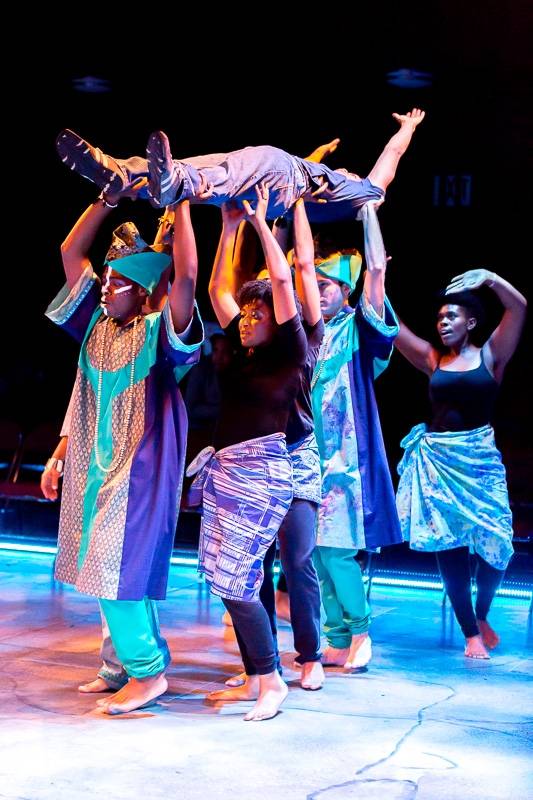
Dontrell, Who Kissed the Sea is very satisfyingly just such a play. I highly encourage you to see it on any of its remaining evenings, but especially for the “talkbacks” taking place on Sunday, October 9th at 3 p.m. and Thursday, October 13th at 7:30 p.m. Even if the performance says it is sold out, there were still about a dozen free seats on the sold-out performance I attended, so get on the waiting list. The show’s run ends on October 14th, and tickets start at $25. For the full schedule and pricing structure, please see the production’s page on the Krannert Center website. Oh, and the play does contain some moments of adult content.
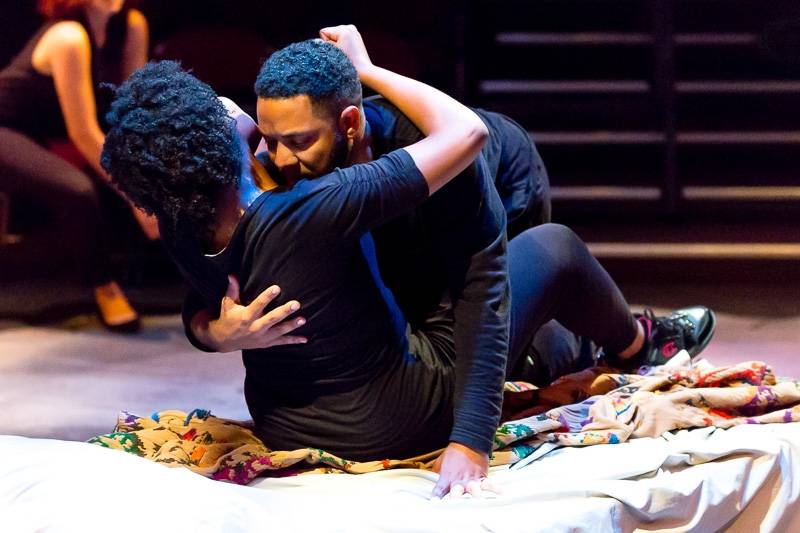
All images by Scott Wells…
Scott is a U.S. Navy veteran and a graduate of the University of Illinois. He has been a photographer and writer for Smile Politely since March of 2015.








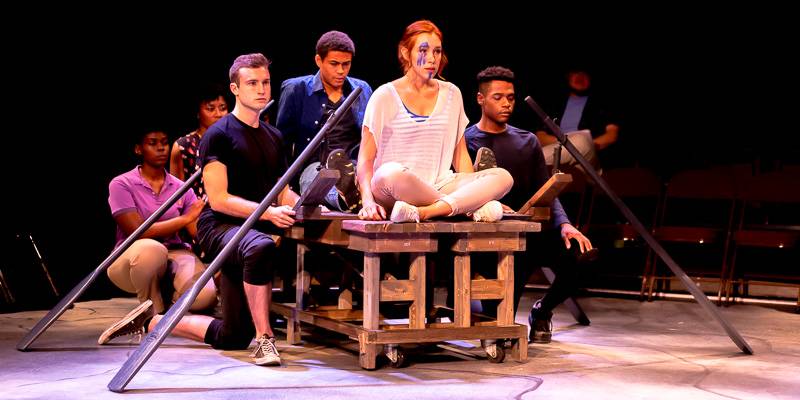
 Scott is a U.S. Navy veteran and a graduate of the University of Illinois. He has been a photographer and writer for Smile Politely since March of 2015.
Scott is a U.S. Navy veteran and a graduate of the University of Illinois. He has been a photographer and writer for Smile Politely since March of 2015.